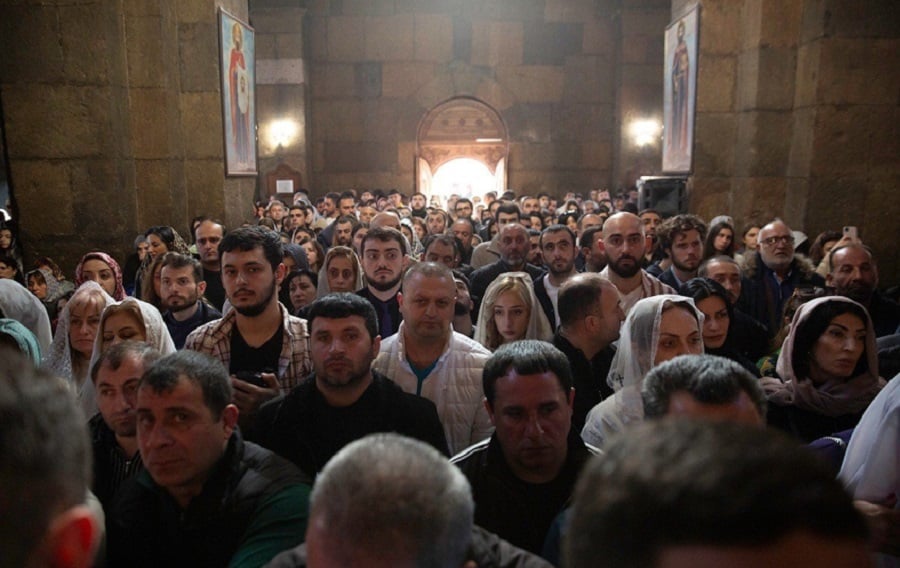“ACNIS ReView from Yerevan”. Volumes have been written about the inseparable bond between the Church and the state, particularly in the context of Armenia. The Armenian Apostolic Church has played a central role in the national and political life of Armenians since the fourth century, when Armenia became the first nation to adopt Christianity as a state religion. The Church stands as one of the fundamental pillars of our national identity, exerting profound influence throughout history and continuing to play a vital role in the lives of the Armenian people. In the absence of robust public institutions, the Church has frequently acted as a quasi-state entity, organizing spiritual and cultural life while serving as a bastion of the Armenian nation-state. For 17 centuries, the Armenian Church and its people have journeyed together, their bond so deep and enduring that they have become nearly inseparable. Although Armenia is a secular state, persistent antagonism between the Armenian Church and government authorities has only strengthened the Church’s resolve and elevated its moral authority in the eyes of many.
The Church’s presence in individuals’ lives begins as early as the eighth day of birth with the sacrament of baptism and extends to their final rites. Against this backdrop, Nikol Pashinyan’s statement that “The Church must be returned to the people, just as they ‘returned’ the government in 2018” rings hollow. First, the Church has never been alienated from the people; it has always been among them, intertwined with their identity and existence. Second, Pashinyan’s rhetoric appears disingenuous, considering his administration’s track record. His governance has been marked more by mismanagement and erosion than by restitution or constructive leadership. This is evident in his handling of the Artsakh issue, territorial disputes, and the governance he assumed in 2018—all of which remain unresolved or exacerbated. Promises and commissions have proliferated, yet substantive results remain conspicuously absent.
What the ruling political force, and Pashinyan personally, have been undertaking against the Armenian Apostolic Church since May 29 is not a return of something to the people but rather a theft of something from the people. This theft may not carry significant material value, but it holds immense spiritual and moral weight. It is no surprise that Armenians, both within the country and abroad, have risen in opposition to the authorities’ relentless encroachments on the Armenian Apostolic Church. There is no justification for conflating the people’s name with these shameful, self-serving maneuvers and sordid political games involving the notorious “treacherous couple.”
By and large, Nikol Pashinyan has lost the moral authority to speak on behalf of the Armenian people. He has nearly exhausted their trust and legitimacy, as evidenced by various polls and the results of local government elections in Yerevan, Gyumri, Parakar, and other regions. The exclusive right to represent the people’s voice now seems to rest with the Catholicos of All Armenians, Garegin II, whose approval rating is significantly higher. This sentiment was reaffirmed on June 10 at Zvartnots Airport, where hundreds, if not thousands, of people gathered at midnight to welcome His Holiness the Supreme Patriarch upon his return from the UAE, demonstrating their steadfast support for the Armenian Apostolic Church.
Read also
The Armenian people have repeatedly demonstrated their devotion to their Christian faith and the Church through their actions and personal conduct, without any need for mediation by political forces, particularly the Civil Contract Party. One striking example was the large-scale rally held in Yerevan on May 9, 2024, organized by the “Tavush for the Homeland” movement, led by Archbishop Bagrat Galstanyan, Primate of the Tavush Diocese of the Armenian Apostolic Church. According to various estimates, between 70,000 and 100,000 citizens participated.
The rally was a clear demand for Pashinyan’s resignation. The people, marching for three to four days from Tavush to Yerevan, filled Republic Square with a singular agenda. They even extended Pashinyan a deadline: first an hour, then an additional 30 minutes. Yet, the prime minister remained unmoved, refusing to address the people’s demands. This inaction revealed a profound disregard for the citizens he claims to serve. Pashinyan has consistently demonstrated that he knows how to use the people’s name to serve his own parochial goals, but when faced with accountability, he falters. For him, the position of prime minister is not merely a role but an irreplaceable possession. His unwillingness to relinquish power, despite the overwhelming call for his resignation, epitomizes his disregard for the people’s will. The unanswered hour and a half may have symbolized his contempt or simply his inability to prioritize the nation’s needs above his own ambitions.
The Armenian Center for National and International Studies


















































